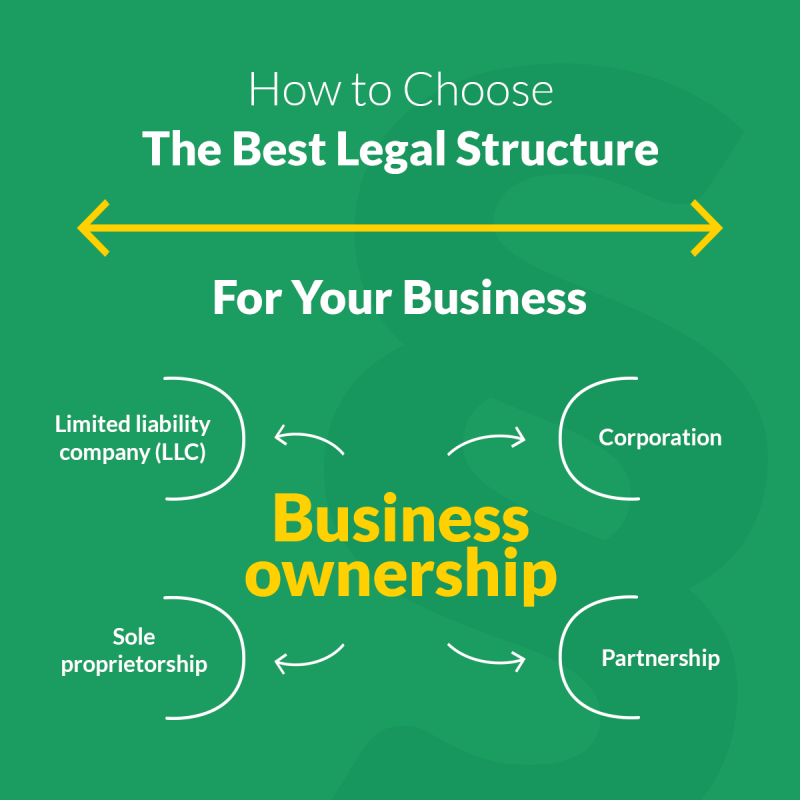One of the decisions that a startup founder needs to make is to choose the right legal structure for the company. There are many available solutions. Good examples are the forms available in the United States, although they also appear in other countries, but under different names. Which legal structure works best for a startup? Read our article and find out.
Which legal structure is best for your business? – table of contents:
- Sole proprietorship
- Limited liability company (LLC)
- Partnership
- C corporation (C-corp)
- Why do investors like corporations?
- Which legal structure works best for a startup?
Sole proprietorship
Startup founders face many difficult decisions, and choosing the proper legal structure for the company is one of the most important ones. There are various options available and each has its pros and cons. The simplest solution is to set up a sole proprietorship as it does not involve complicated procedures, and such a business has no legal personality.
In this case, for the tax authorities, the owner and the company are one. You do not need to register such a business as far as the USA is concerned. It is enough to start a business activity and pay taxes. However, if you need to get a permit or a license, go to the right office. If you want to reserve a company name, apply for a DBA certificate.
Limited liability company (LLC)
Another popular legal structure for startups is the LLC or limited liability company. Why is it so advantageous in the United States? First of all, the costs of launching such a company are low, and the company’s results are included in the personal annual tax return.
What is important, however, is that the company’s shareholders are not personally liable for the startup’s debts and legal obligations. In this case, the company exists as a separate entity, not directly connected to the founder’s assets. This legal structure will make your business more credible.
Partnership
A very popular choice for a startup is a partnership structure. Such an organization can be owned by at least two people. There are two options: general partnership or limited partnership. The first is the cheapest and easiest to set up. In this case, responsibilities are shared among all partners equally.
In a limited partnership, on the other hand, one founder is responsible for running the startup, while the other partners receive a fraction of the profits, but also have limited liability in the company. A general partnership seems to be a better option, as it has a more transparent structure and attracts investors more easily.

C corporation (C-corp)
Sooner or later, startups that are successful become C corporations (e.g. Google). A C corporation is an entirely separate legal entity from its founders, which is forced to prepare annual reports and pay corporate taxes. A board of directors is required for such a structure.
Such a corporation is regulated at the state level, and the cost of launching such a company depends on the specific US state. The owner of a C-Corp is the person who has shares in it. These shares are transferred, which changes the structure of the company. The shares of such a company are sometimes listed on the stock exchange. Income from a C-Corp is taxed twice.
Why do investors like corporations?
If you are serious about attracting investors, you have the best chance of doing so with a C-corp structure. This is the form that most investors love. Why? In the case of a limited liability company (LLC), investors have to pay additional taxes on their share of the startup’s profits.
It’s easy to guess that they don’t like it, and startups often lose the chance to raise capital because of it. LLCs are not allowed to have more than a hundred shareholders, and only American ones, and are prohibited from raising equity investments from other companies. In the case of a C-Corp, there are no such restrictions.

Which legal structure works best for a startup?
You have just learned about some of the most popular legal structures a company can adopt. Which structure works best for a startup? The business structure you choose should be aligned with the set business goals. These, in turn, ought to be determined at the stage of creating a business plan.
It’s impossible to decide straight away whether an LLC will be better than a sole proprietorship. It all depends on the situation of a particular startup. After all, the structure of the company can be changed when necessary. However, it seems that the target structure is a C-Corp, which is often required by investors.
Read also: 7 startup roles explained.
If you like our content, join our busy bees community on Facebook, Twitter, LinkedIn, Instagram, YouTube, Pinterest.
Author: Andy Nichols
A problem solver with 5 different degrees and endless reserves of motivation. This makes him a perfect Business Owner & Manager. When searching for employees and partners, openness and curiosity of the world are qualities he values the most.
Launch your startup:
- What is a startup?
- Pros and cons of creating a startup
- 8 best industries for startups
- Top 5 skills every highly successful startup founder needs
- How to create a startup? 7 simple and easy steps
- 6 essential startup development stages
- How to create a startup growth strategy?
- General startup statistics you need to know
- Startup vs. corporate job. Which is right for you?
- 5 incredible companies that started in a garage
- How to find a business idea?
- How to check if your startup idea already exists?
- How to name a startup? Useful tips and strategies
- How to gain business knowledge quickly? 5 best practices
- Why do startups fail? 6 startup ideas you should avoid
- 5 weird business ideas that made millions
- Top 6 most profitable small businesses
- 7 questions to determine if your business idea is worth pursuing
- What is a buyer persona? 5 benefits of creating a buyer persona
- How to validate your business idea? 3 easy steps
- Should you follow your passion? The importance of passion in business
- What is market reseach and why is it important?
- Using social media in business
- What to do when you have too many business ideas?
- How to write a good problem statement for your startup?
- How to test your business idea for real?
- How to create a prototype for a product?
- How to build an MVP?
- How to use surveys for testing your business idea?
- 10 useful tools to validate your business idea
- What is a business plan? 4 types of business plans
- What should be included in a business plan?
- What should a product description include?
- Competitor analysis
- Marketing strategy
- Traditional business plan vs. lean startup plan
- Implementation plan. What is it and how to create it?
- Everything you need to know about patents
- Financial management for startups
- What permits and licenses does my startup need?
- What is the average startup founder salary?
- 4 startup taxes you need to pay
- Which legal structure is best for your business?
- Startup costs. How much money will you need?
- Protection of intellectual property in a startup
- Family funding vs. self-funding
- What is a shareholders’ agreement?
- What should a financial section of a business plan include?


















